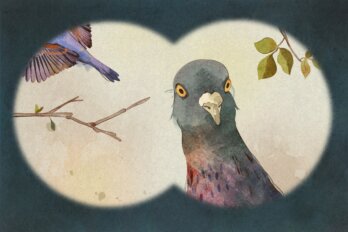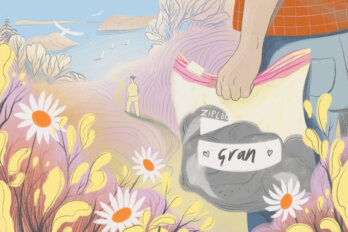It’s been almost two years since my breakdown and I still haven’t figured out how to talk about it. The word breakdown sounds imprecise, or perhaps just insufficient; mental health crisis feels too sterile. The short explainer I often rely on is that I had depression nearly my whole life and let it fester, self-medicating only with intoxicants and sex. The collapse I experienced in February 2019 was the inevitable result of living with secret emotional gangrene for twenty-some years.
In the immediate aftermath, I quit alcohol and drugs, sought counselling, and began taking antidepressants. After about a year, I began cautiously reintroducing things I had set aside during my recovery. The first was alcohol—I was so nervous about having a drink that I’ve managed a cumulative total of two pints over the past six months. Next came dating, a prospect just as frightening. The flotsam of my last romance still followed me around, and meeting new people felt like a risk. During the early months of 2020, I could see dating on the horizon, but I couldn’t convince myself I was quite ready yet.
Then COVID-19 arrived. At first, I figured that the pandemic would only further delay my return to romance. Everything from poetry readings to the Olympics was cancelled, or at least deferred, and no one knew how bad things would get—the only certainty was that we all had to stay away from one another. “It’s just so hard to meet people these days” was a cliché that finally felt apt: stuck at home day after day, it really was hard to meet new people. I was partly relieved at having the decision taken out of my hands, but I was also deflated at the thought of my love life being deferred indefinitely.
But, the more I considered my circumstances, the more the pandemic seemed to be the ideal time for those, like me, who were ambivalent about getting back into the dating world. I wouldn’t be able to find myself in a Hollywood-esque “meet cute” where I’d form an instant connection with a stranger at a party or in line at a grocery store, but online dating was still an option—I wasn’t set against an origin story of “We both swiped right.”
And perhaps lockdowns and social distancing could actually improve online dating, not just for my atypical circumstances, but for everyone worried about meeting someone new or burned out by the constant churn of hook-up apps. After all, COVID-19 meant taking things slow—the virus had thrown us all into a world where consideration and boundaries were not only expected but necessary. The pandemic, then, could act as a relationship guardrail: the caution I felt I would need for my mental health would align with the caution of meeting someone new during a pandemic. Both sides would need to communicate, need to take the time to get to know the person opposite. We’d have to verbalize our wants and boundaries and fears. In other words, my circumspection would be not weird but the norm.
With this newfound sense of security, I downloaded a few apps, made profiles, and jumped back into the turbulent ocean of dating, hoping that our new hyperaware COVID-culture would mean calmer waters for all.
I’m in my mid-thirties, which means I’m of the more-or-less last generation not born into the internet’s world. I remember dating before Tinder, Bumble, Grindr, and all the other apps. Of my handful of significant relationships, I’ve met people both through the internet and the old-fashioned way: I know that, though relationships themselves haven’t changed, how we find one another has.
The ability to flip through pictures of humans who may be exactly what you’re looking for has changed our behaviours and expectations around romantic relationships, for better and worse. We match, we chat, we meet, and with plenty of fish in the digital sea, we repeat this cycle ad nauseum. This year, there were 1.6 billion swipes each day on Tinder alone, and since its inception, 30 billion matches. For many, dating through these mediums is a numbers game. But, for all the positives (shy or anxious people may feel less reticent about starting a conversation; those who may be curious but hesitant about exploring their sexuality now have a less intimidating entry point), there are negatives (the increased harassment that online disinhibition brings, the ease with which people now ghost one another). Whether online dating has net value ultimately depends on what downsides you’re willing to put up with as you search for a connection.
The effects of COVID-19 are everywhere, so I shouldn’t have been surprised to find its influence extended to online dating profiles. The bad puns were now topical (“If covid doesn’t take you out, can I?”; “Is that hand sanitizer in your pocket, or are you just happy to be within 6 feet of me?”). Other profiles, like the one declaring the pandemic to be a hoax and that “nothing will stop me from enjoying what time we all have left on this earth so screw it,” became a guiltless swipe left. The apps had changed too: Bumble had new features to indicate what types of dates you were comfortable with—virtual, socially distanced, distanced with mask; Hinge, meanwhile, offered date-from-home video chats.
In the same way that walking around your neighbourhood during the early days of COVID-19 felt familiar yet undeniably changed, online dating straddled a similar line. It wasn’t just the new features: interactions often felt friendlier somehow, and the idea of consent was ever-present. People even seemed more upfront about what they were looking for in love and what they expected in return. Perhaps it was just an extension of the newfound caution we’d all internalized, but it felt as though the danger of the pandemic had made us more intent on finding certainty where we could.
After a few days of hesitant swiping, I had a few matches, which led to a few, mostly short-lived, chats. Some version of “How are you holding up?” and jokes about living in end times were common icebreakers but led to surprisingly earnest conversations. In my past dating life, I’d understood the importance of discussing expectations and objectives, but now, these conversations seemed to have a clarity and frankness bestowed by a universal sense of heightened caution. My profile was upfront about my depression and dating anxieties—I worried this might be too upfront, but several women praised the honesty.
I knew at some point I’d have to actually go on a date. Luckily, going slow seemed to be everyone’s plan. After a couple weeks of chatting, one of my matches finally suggested going for a walk with my dog, and I said yes before I could let my brain talk me out of it.
We met on a cool day, but I started sweating through my shirt. She seemed nice: smart, funny, certainly attractive. The awkward etiquette of meeting someone from online—Is a handshake too formal? Is a hug too familiar?—was dispensed with in favour of a smile and hello from six feet away. We walked and talked for an hour or so, and the date was perfectly pleasant. But something felt off, and I didn’t feel the expected connection or excitement. Was it that we weren’t a good match? Was it the stress of the pandemic? Had my romantic muscles atrophied? Was I just broken?
We met a few more times over the next several weeks for similar walks. But those feelings held firm, and I confessed to her that I didn’t feel ready for this, whatever this was. She understood, and after considering my offer of platonic friendship, said that she couldn’t do it—she liked me, and that wouldn’t be a good scenario for either of us. It was all quite mature and responsible, and we parted ways amicably. Whether this was the pandemic making dating more forthright or just two people navigating a weird situation with care and good intentions, I can’t be sure. But I’d like to think that maybe COVID-19 will make better romantic communicators of us all.
Our lives are disrupted in so many ways for the foreseeable future, and with the stress and loneliness brought by the pandemic, dating has new importance for many. Before I started meeting people again, I was self-conscious that it might seem like I was bringing all my mental health baggage to a stranger and asking them to help me carry it. But the suddenness with which the world changed has revealed the fragility of all our lives—isolation and loneliness are feelings that many are now sitting with, but no one has to go through these alone. As winter continues and pandemic restrictions fluctuate in many cities, dating in some form will remain an option—though any app holdouts will have to jump aboard if they want to meet someone new in the coming months.
I’m still on the apps, though my profiles make clear that I’m seeking only friends for the time being. Rather than choosing an arbitrary moment to jump into the water, I’ve decided to hang out on the beach for a while, making acquaintances and walking my dog until someone comes along who makes me forget my fear of sharks. Maybe the world will be a little less distanced by then. Or maybe we’ll still be figuring it out as we go.




